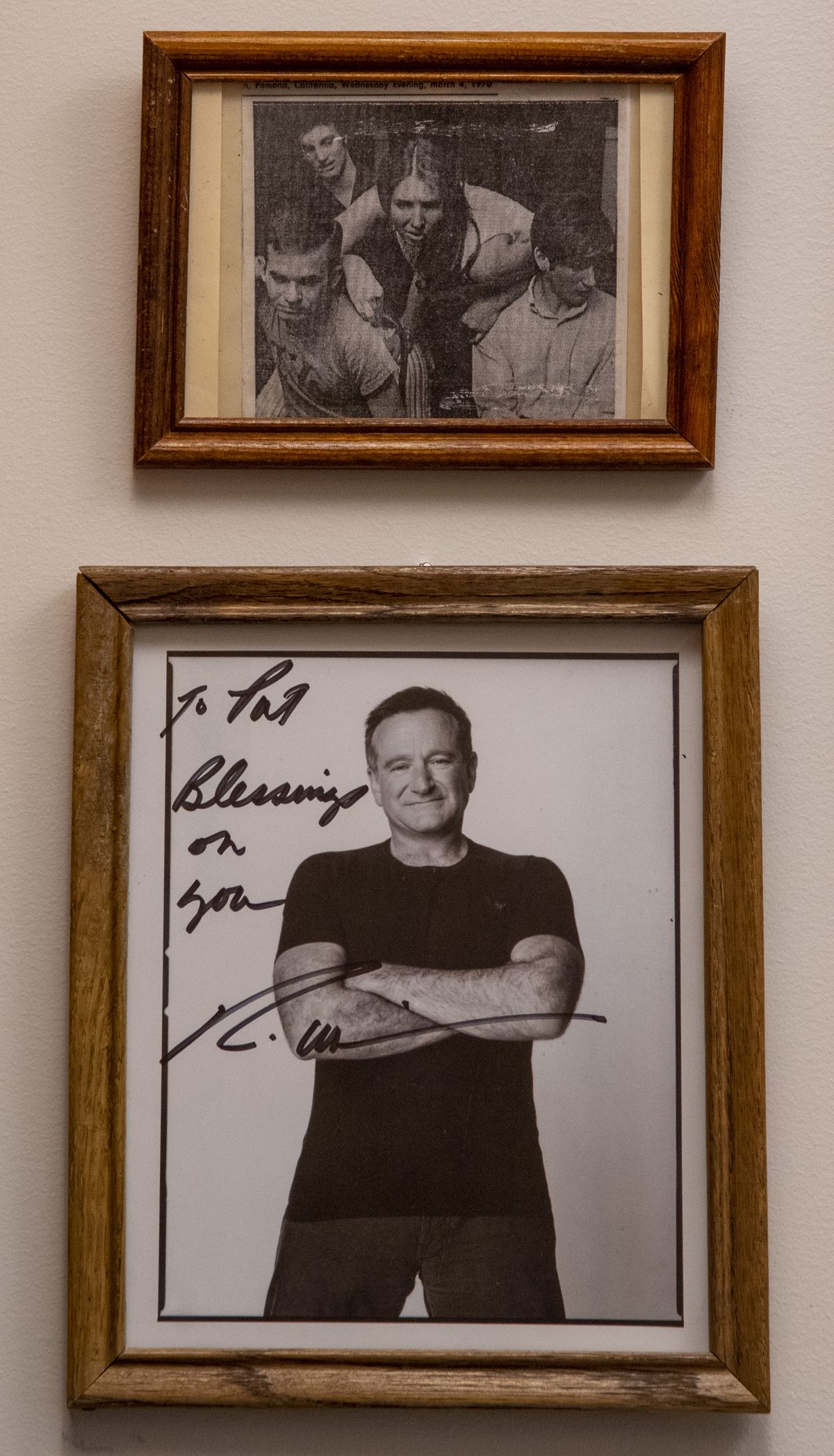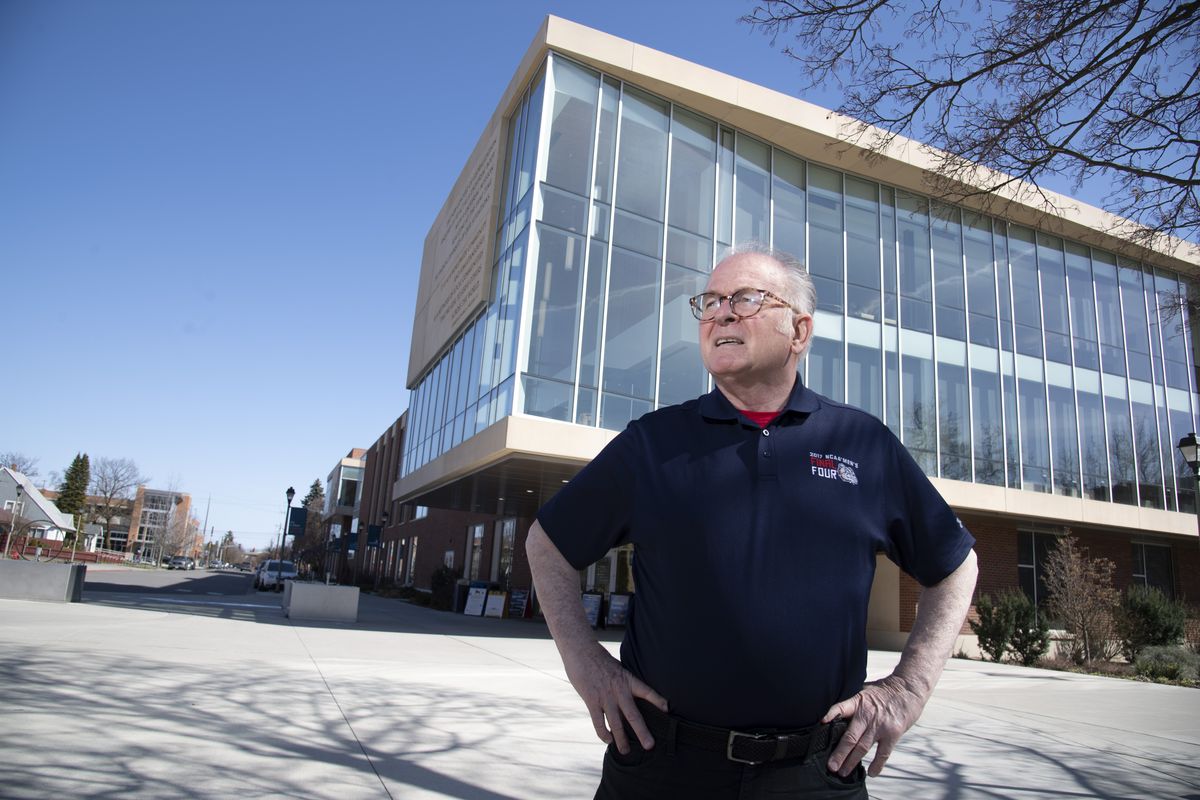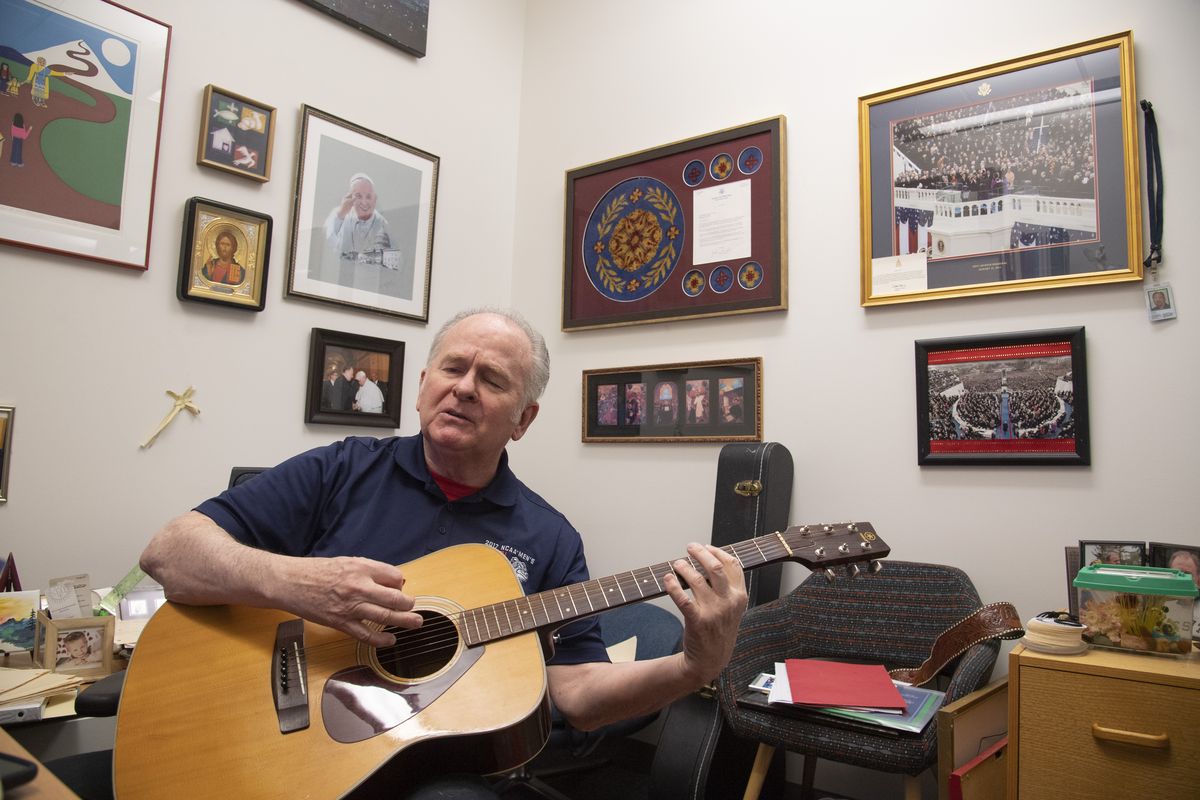The ‘Nembhard of Mission and Ministry’: Gonzaga campus minister reflects on faith and his time as U.S. House chaplain
Rev. Patrick Conroy, S.J., plays guitar in his small office in Hemmingson Center at Gonzaga University Wednesday, Mar. 31, 2021 where he is assigned to campus ministry. Conroy said that he began playing guitar as a teen years ago, when “everybody wanted to be the fifth Beatle.” Long ago, he spent a year in Gonzaga law school decades ago before joining the Jesuits. Conroy recently spent 10 years as Chaplain of the U.S. House of Representatives. (Jesse Tinsley/THE SPOKESMAN-REVI)
Despite a popular assumption among family and friends upon his recent assignment to Gonzaga University, the Rev. Patrick Conroy is not traveling with the men’s basketball team.
Working with the team and related alumni could be something he does in the future, said Conroy, who’s been a campus minister at Gonzaga for the past three months. And while he wouldn’t campaign for the opportunity, Conroy – once a timekeeper for Georgetown University games during a previous chaplaincy – wouldn’t say no if he was asked.
“I can’t claim any responsibility for their success,” Conroy said a day after the team’s win over the University of Southern California to advance to the NCAA Tournament’s Final Four.
Conroy, 70, is adjusting to campus life three months removed from serving as chaplain for the U.S. House of Representatives.
The first Jesuit in the role, Conroy served the House for nearly a decade before returning to Gonzaga, a place where he once worked toward a congressional role in his younger days – just not one as a man of the cloth.
Road to Damascus
Lawyer, politician, U.S. senator.
That was the master plan for Conroy at Gonzaga’s School of Law in taking after his lawyer father, Stanley. Having graduated from Claremont McKenna College (then known as Claremont Men’s College) in 1972, the Everett native chose Gonzaga in part because the school’s pass rate on the Washington bar exam was the highest in the state at the time, he said.
He didn’t plan for Gonzaga’s on-campus Jesuits, however, who “shattered” his perception of Catholic priests as serious, dignified, polite, inoffensive, generous – “all those good things,” he said. Conroy said the first time he saw a priest not wearing a Roman collar was when he met some of the Jesuits at Gonzaga.
“They were interesting people to be around. They had senses of humor; if they stepped in some dog doo, they would tell you they stepped in some dog ‘fill in the blank,’” Conroy said. “If a person could be a priest that’s like this, I could be a priest, because these guys are normal, at least by my standards. That was my ‘a-ha’ in terms of religious imagination.”
It was also during his first year of law school that Conroy attended a retreat and made a commitment to God.
“My promise was, if God showed me what he wanted me to do, I would do it,” Conroy said.
He feels he got his answer on a particular Friday in December, five days after making that promise.
Conroy, coming off a collegiate track and cross country career, was on a daily run when he couldn’t stop thinking about the priesthood. That he was thinking at all was unheard of, Conroy said; he could never focus on anything during his runs as he would get into a “zone.” He said he didn’t formulate the significance of the experience until talking to some friends afterward about the retreat.
It was a “road to Damascus moment,” he said. The phrase comes from the Bible story of one of Jesus Christ’s apostles, Paul, who was called Saul before converting to Christianity.
According to the story, Saul was a persecutor of Christians who was traveling to Damascus when he was struck from his horse and blinded by a light, from which Jesus spoke to him. Saul was then taken to Damascus where another Christian, Ananias, prayed over him to return his sight and baptize him into the Christian faith.
“It was such a shocking moment of revelation,” Conroy said. “Suffice it to say, I was knocked off my political horse and shown what God wanted me to do, and it was to become a Jesuit. I’ve never doubted that moment.”
Becoming a Jesuit
Conroy entered the Jesuit order in 1973 and took his final vows in 1989.
Jesuits form the Society of Jesus, a Roman Catholic order of priests and brothers founded by St. Ignatius Loyola. The Jesuit formation is a yearslong endeavor that involves academic study, vows and community service.
Conroy’s formation saw him return to law school at the Jesuits’ request, he said. He earned his master’s degree in philosophy from Gonzaga, a Juris Doctor from St. Louis University, a master of divinity from the Jesuit School of Theology at Berkeley, California, and a master of sacred theology from Regis College of the University of Toronto.
While many Jesuits in formation are tasked with teaching at high schools for two to three years, Conroy was assigned to practice law for the Colville Confederated Tribes in Omak, Washington. He also represented Salvadoran refugees for the Conference of Catholic Bishops’ Immigration Office in San Francisco while studying theology. Conroy’s last year of formation saw him working as a lobbyist at the national Jesuit Office of Social Ministries in Washington, D.C.
“The Jesuits, because of who I was and my education, wanted me to finish that law degree because the Jesuits were imagining that I would be missionable and of value to the mission if I were a lawyer,” Conroy said. “That’s where the vow of obedience kicks in.”
Conroy made vows to obedience, poverty, chastity and obedience to missions given by the pope during the formation process. He served out of the Oregon Province of the Society of Jesus, which has since been reorganized into Jesuits West.
The ‘90s saw Conroy working in the capacity of a university chaplain, directing student retreats at Georgetown for four years followed by a three-year stint at Seattle University. He then returned to Georgetown for another 6 1/2 years.
He was initially hired at Georgetown by the Rev. William Watson. Watson, a Spokane native, said the two have been best friends for many years, having entered the Jesuit order at the same time.
In their initial years with the Jesuits, Watson said he and Conroy conducted a novice experiment together in the Skid Row district of downtown Portland, living out similar experiences as those encountered by people in poverty.
From a professional standpoint, Watson said he hired Conroy to run a freshman interfaith program because of Conroy’s engaging personality and the way he brings people together. He said Conroy was the type to wear colorful outfits, like a poncho made out of a Pendleton blanket.
“He mingles well and he’s a very good conversationalist, and I think that’s why Gonzaga hired him because he brings that cachet from his Georgetown, Capitol Hill experience,” said Watson, president and founder of the Sacred Story Institute. “He’s coming back to a place that’s familiar, and I think he’s going to thrive there and do very, very well.”
Conroy’s return to the Pacific Northwest was at the behest of his provincial, the Rev. John Whitney, who assigned him in 2003 to serve at Portland’s Jesuit High School for more than seven years. There, he taught freshman theology and coached the Mighty JV II girls’ softball team.
And while he enjoyed teaching the young teens, Conroy said he was getting tired of adolescent angst and energy (something adolescents are entitled to, he added). He expressed his fatigue to his provincial during a meeting that was planned months in advance.
Conroy recalled telling his provincial, then the Rev. Patrick Lee, that he didn’t know what else he wanted to do; he just knew that he shouldn’t be teaching high school anymore.
“And (Lee) said to me, ‘Well, something just came up and I want you to apply.’”
Serving the House
In January 2011, U.S. Rep. Nancy Pelosi was supplanted as speaker after the Democrats lost the majority in the House of Representatives. The distinction went to U.S. Rep. John Boehner, an Ohio representative who attended Xavier University, a Jesuit institution in Cincinnati.
Meanwhile, the Rev. Daniel Coughlin, who was the first Catholic elected as House chaplain, retired after 11 years in the role. Boehner, Conroy said, asked the search committee to explore Jesuit candidates.
“(Lee) knew that I had the potential to fill this position,” Conroy said, citing his legal and educational background. “So, holy obedience, I applied to be the chaplain. Not because I want it, not because I’m going after it. I was asked to by my superior.”
He believes those values made him stand out among candidates who were “politicking for the role.”
Conroy’s nomination was announced May 6, 2011, pending a formal House vote.
Pelosi reconsidered her support for Conroy, however, when it came to light that the Oregon Province of Jesuits had recently paid $166 million for more than 400 claims of child sexual abuse. The situation was compounded by a letter Conroy wrote in 1986 to then-Archbishop Raymond Hunthausen about a molestation claim concerning another priest. Conroy said he didn’t hear back from the archbishop and didn’t follow up, according to the Oregonian; the priest in question, meanwhile, resigned in 2002 following accusations of child molestation.
Pelosi’s office found after additional questioning there was no evidence connecting Conroy and the abuse allegations. He was sworn in May 25, 2011.
Conroy said the role was different from that of a traditional pastor, who is expected to proactively meet with their parishioners and build a particular religious community.
“A chaplain is not about building a faith community because the people that a chaplain is responsible for come from various faith traditions,” he said. “So the chaplain’s ministry is being available for the encouragement of and assistance in spiritual or human growth for everyone the chaplain’s responsible for within their own tradition or personal life.”
During his time as chaplain, Conroy said he met all kinds of interesting people, including the Dalai Lama, Pope Francis and President Emmanuel Macron of France. He considered it a privilege to befriend the various members of Congress, including the late U.S. Rep. John Lewis, who Conroy said was “one of the greatest Americans of our age.”
Conroy also officiated three weddings for members of Congress, including the ceremony for U.S. Rep. Dan Newhouse and his wife, Joan.
In a statement, Newhouse, R-Wash., said Conroy “will always have a special place in my and my family’s heart.” He commended Conroy for presiding over “some of the most contentious and controversial sessions of Congress in our history.”
“His role may be one of the most overlooked positions in the House, but he fulfilled it with grace and honor,” Newhouse said, adding, “I’m proud to have served alongside him, and it is great to see him return to his Washington roots as a campus minister at Gonzaga.”
Newhouse’s wedding took place just months after Conroy nearly resigned as House chaplain.
Conroy submitted his resignation April 16, 2018, at the request of then-House Speaker Paul Ryan. The request came after Conroy delivered an opening prayer the previous November during debate on tax overhaul legislation. As part of the prayer, Conroy asked for Congress to “guarantee that there are not winners and losers under the new tax laws, but benefits balanced and shared by all Americans.”
Conroy recalled meeting with Ryan’s chief of staff, Jonathan Burks, the Friday before he submitted his resignation. At that time, Conroy believed it was within the House speaker’s purview to end his chaplaincy, he said.
“In the House of Representatives, what the speaker wants, the speaker gets,” he said.
But after House members from both sides of the aisle questioned Ryan’s actions, Conroy rescinded his resignation with a letter to the House speaker, in which he outlined the conversation with Burks.
“I inquired as to whether or not it was ‘for cause,’ and Mr. Burks mentioned dismissively something like ‘maybe it’s time that we had a Chaplain that wasn’t a Catholic,’” Conroy wrote in his letter to Ryan rescinding his resignation. “He also mentioned my November prayer and an interview with the National Journal Daily.
“You may wish to outright ‘fire’ me, if you have the authority to do so,” Conroy later continued, “but should you wish to terminate my services, it will be without my offer of resignation, as you requested.”
Conroy said Ryan called him 15 minutes after he submitted his follow-up letter and accepted it, later taking Conroy to dinner at the U.S. Capitol.
Return to Gonzaga
Conroy’s actual departure from his House chaplaincy was done with comparatively less fanfare.
Conroy said he heard rumblings that he was going to be replaced, but was never told directly until meeting with Pelosi late last year. In late December, Pelosi simultaneously announced Conroy’s retirement while introducing Retired Rear Adm. Margaret G. Kibben, a Presbyterian, as the first woman to serve as chaplain in either chamber of Congress.
“It took 210 years for the first Catholic to be named House chaplain. It took 230 years before the first woman was named chaplain for the House of Representatives,” Conroy said. “Maybe it was about time.”
Pelosi described Conroy’s service as “a blessing to Members on both sides of the aisle.”
“Throughout his service, Father Pat fulfilled the calling of St. Ignatius of Loyola: ‘for the greater glory of God,’” she said. “His service has been a spiritual and moral anchor for Members, grounding our institution in the values of faith and country and reminding our Members of our responsibilities to our great nation and constituents. All Members wish Father Pat well as he enjoys his well-deserved retirement from the House.”
For his part, Conroy denies he ever retired.
“I didn’t resign. I didn’t retire,” he said. “I was replaced.”
Holy obedience once again in play, Conroy’s return to Gonzaga – this time as a campus minister – came about similarly to how he became House chaplain: as an assignment from his superior. Conroy said his provincial coordinated the assignment with Gonzaga President Thayne McCulloh and other university Jesuits.
Conroy said going from working with congressional politicians to Gonzaga students has since been a “major adjustment.” He’s spent the last three months with Gonzaga’s Office of Mission and Ministry, learning the ins and outs of a university he left in 1977.
Conroy’s work thus far has been limited by COVID-19 restrictions, with most of his focus on preparing activities for next year.
He equates the situation to that of Andrew Nembhard, Gonzaga’s junior guard who transferred to the university this year from Florida. Nembhard’s eligibility to play for Gonzaga this year was unclear until November, when the NCAA granted a waiver two days before the Zags opened the season.
“They were going to be great, and now, they’re going to be greater – and it’s proven true. And it’s like a gift. A pure gift. We didn’t plan for this, but now we’ve got Andrew Nembhard,” Conroy said. “Well, I’m the Andrew Nembhard of Mission and Ministry.”


